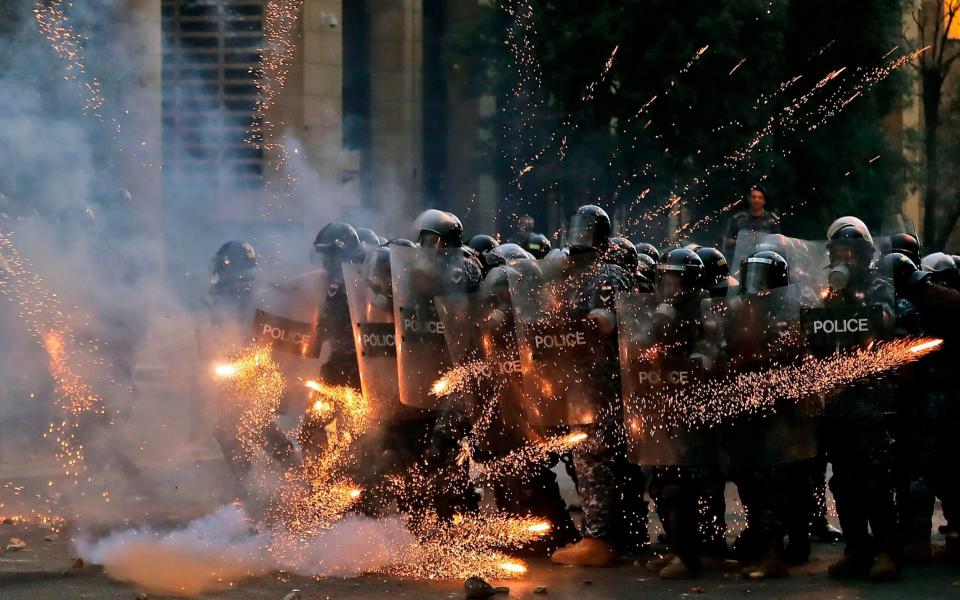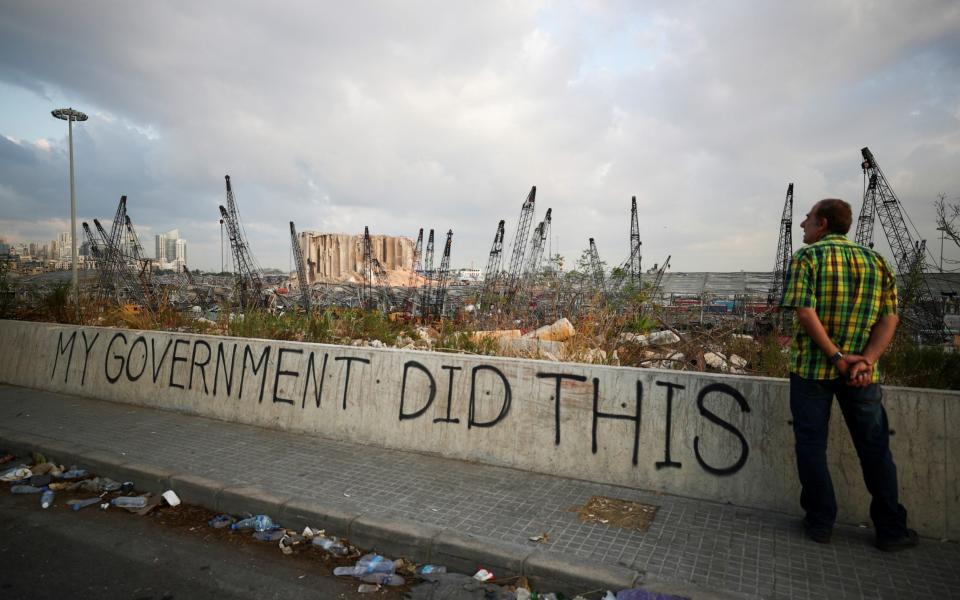Lebanon's prime minister was warned in July that explosives 'could destroy Beirut'

Lebanese security officials warned the prime minister and president last month that 2,750 tonnes of ammonium nitrate stored in Beirut's port posed a security risk and could destroy the capital if it exploded, according to documents seen by Reuters and senior security sources.
Just over two weeks later, the industrial chemicals went up in a massive blast that obliterated most of the port and swathes of the capital, killed at least 163 people, injured 6,000 and destroyed 6,000 buildings, according to municipal authorities.
A report by the General Directorate of State Security on events leading up to the explosion included a reference to a private letter sent to President Michel Aoun and Prime Minister Hassan Diab on July 20.
While the content of the letter was not in the report seen by Reuters, a senior security official said it summed up the findings of a judicial investigation launched in January which concluded the chemicals needed to be secured immediately.
The state security report, which confirmed the correspondence to the president and the prime minister, has not previously been reported.
"There was a danger that this material, if stolen, could be used in a terrorist attack," the official told Reuters.
"At the end of the investigation, Prosecutor General (Ghassan) Oweidat prepared a final report which was sent to the authorities," he said, referring to the letter sent to the prime minister and president by the General Directorate of State Security, which oversees port security.
"I warned them that this could destroy Beirut if it exploded," said the official, who was involved in writing the letter and declined to be named.

Reuters could not independently confirm his description of the letter.
The presidency did not respond to requests for comment about the July 20 letter.
A representative for Diab, whose government resigned on Monday following the blast, said the PM received the letter on July 20 and it was sent to the Supreme Defence Council for advice within 48 hours. "The current cabinet received the file 14 days prior to the explosion and acted on it in a matter of days. Previous administrations had over six years and did nothing."
The prosecutor general did not respond to requests for comment.
The correspondence could fuel further criticism and public fury that the explosion is just the latest, if not most dramatic, example of the government negligence and corruption that have already pushed Lebanon to economic collapse.
As protests over the blast raged in Lebanon on Monday, Diab's government resigned, though it will remain as a caretaker administration until a new cabinet is formed.
The rebuilding of Beirut alone is expected to cost up to $15 billion, in a country already effectively bankrupt with total banking system losses exceeding $100 billion.
Aoun confirmed last week that he had been informed about the material. He told reporters he had directed the secretary general of the Supreme Defence Council, an umbrella group of security and military agencies chaired by the president, to "do what is necessary".
"(The state security service) said it is dangerous. I am not responsible! I don't know where it was put and I didn't know how dangerous it was. I have no authority to deal with the port directly. There is a hierarchy and all those who knew should have known their duties to do the necessary," Aoun said.
Many questions remain over why the shipment of ammonium nitrate docked in Beirut in late 2013. Even more baffling is why such a huge stash of dangerous material, used in bombs and fertilisers, was allowed to remain there for so long.
The letter sent to Lebanon's president and prime minister followed a string of memos and letters sent to the country's courts over the previous six years by port, customs and security officials, repeatedly urging judges to order the removal of the ammonium nitrate from its position so close to the city centre.

The General Directorate of State Security's report seen by Reuters said many requests had been submitted, without giving an exact number. It said the port's manifest department sent several written requests to the customs directorate up until 2016 asking them to call on a judge to order the material be re-exported immediately.
"But until now, no decision has been issued over this matter. After consulting one of our chemical specialists, the expert confirmed that this material is dangerous and is used to produce explosives," the General Directorate of State Security report said.
In January 2020, a judge launched an official investigation after it was discovered that Hangar 12, where the nitrate was stored, was unguarded, had a hole in its southern wall and one of its doors dislodged, meaning the hazardous material was at risk of being stolen.
In his final report following the investigation, Prosecutor General Oweidat "gave orders immediately" to ensure hangar doors and holes were repaired and security provided, a second high-ranking security official who also requested anonymity said.
On June 4, based on those orders, state security instrufcted port authorities to provide guards at Hangar 12, appoint a director for the warehouse and secure all the doors and repair the hole in the southern wall, according to the state security report and security officials.
The port authorities did not immediately respond to requests for comment.
"The maintenance started and (port authorities) sent a team of Syrian workers (but) there was no one supervising them when they entered to fix the holes," the security official said.
During the work, sparks from welding took hold and fire started to spread, the official said.
"Given that there were fireworks stored in the same hangar, after an hour a big fire was set off by the fireworks and that spread to the material that exploded when the temperature exceeded 210 degrees," the high-ranking security official said.
The official blamed port authorities for not supervising the repair crew and for storing fireworks alongside a vast deposit of high explosives.
Reuters could not determine what happened to the workers repairing the hangar.
"Only because the hangar faces the sea, the impact of the explosion was reduced. Otherwise all of Beirut would have been destroyed," he said. "The issue is all about negligence, irresponsibility, bad storage and bad judgment."
The World Food Programme (WFP) will send 50,000 tonnes of wheat flour to Lebanon after last week's blast destroyed its only silo, a United Nations report said on Tuesday.
Current flour reserves in Lebanon were estimated to cover market needs for six weeks. Lebanon consumes between 35,000 to 40,000 tonnes of wheat a month.

 Yahoo News
Yahoo News 